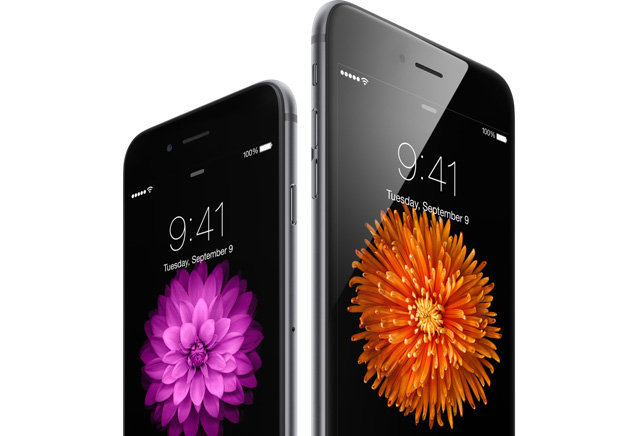The shift of U.S. carriers from contract subsidies to installment pricing for smartphones could speed up upgrade cycles for Apple's iPhone, according to a new memo by financial services firm Piper Jaffray.
Such plans let people pay no money down, and more importantly let some people upgrade ahead of a previously standard two-year window, analyst Gene Munster said this week in a research note, a copy of which was provided to AppleInsider. It's estimated that in the third and fourth quarters of last year, 21.4 million and 32.6 million American smartphone owners were on installment plans respectively.
While not all of those people may be eligible for an early upgrade, or choose to take the option if they are, even a portion of them might be enough to invigorate iPhone numbers.
Munster calculated that if 30 percent of people plan to upgrade at the 12-month point, that implies 6.4 million upgrades in the third quarter of 2015, and 9.8 million in the fourth quarter. Assuming U.S. iPhone marketshare of 45 percent in 2015, Apple could theoretically see 2.9 million extra iPhone upgrades in the third quarter and 4.4 million in the fourth quarter. In the June quarter, Apple controlled 44.1 percent of the U.S. market.
Another complicating factor is that because carriers have been rolling out installment plans on a relatively gradual basis, for instance by letting old plans lapse, Apple may not see any sudden surges but rather an overall improvement.
Early upgrades also frequently demand that person trade in their old device, and millions of people trading in year-old iPhones could eat into Apple's own sales of older models, particularly if resold units undercut the company's prices. The net effect though could be to skew Apple's iPhone sales further towards the high-end, increasing the average selling price, Munster commented.
Apple is expected to reveal new phones — the iPhone 6s, 6s Plus, and possibly a 6c — as soon as Sept. 9, presumably shipping them later in the month. The devices could be the first iPhones to see a meaningful contribution from people on installments.
 Roger Fingas
Roger Fingas







-m.jpg)






 Malcolm Owen
Malcolm Owen
 Marko Zivkovic
Marko Zivkovic
 Christine McKee
Christine McKee
 Andrew Orr
Andrew Orr
 Andrew O'Hara
Andrew O'Hara
 William Gallagher
William Gallagher

 Mike Wuerthele
Mike Wuerthele


-m.jpg)



76 Comments
I think it the new plans will have a negative effect on iPhone sales. People just might keep their phones longer because there is no penalty to do so. Before, the major carriers charged you the same whether you owned your phone or not so people tended to upgraded exactly every two years.
Yet most in Wall street is saying these installment plans are a negative to Apple because customers will opt for cheaper Android phones once they find out iPhones don't cost $199 but rather $650.
I say hogwash. Most customers don't care. All they care about is their monthly payment.
iPhone with installment plan will cost about $70
Android with installment plan will cost about $57
People don't care. They want the nice shinny iPhone. As long as they don't have to pay the $650 upfront it won't matter.
I am not sure. If what you say is true, then why people choose Android in the first place? So price does play a role for some. Question is how big that percentage is. OTOH I agree that someone who can afford $57 probably will also be able to pay $70. And yes, people never think of total cost of ownership, just about monthly installments, even if from a 0% interest POV this might actually make sense to go through installments instead of paying upfront.
On a sidenote; I wonder how Apple will announce the pricing of the next models during the introduction. Jut full price? Or still 0$, 99$ etc based on subsidized contracts?
I just checked out Verizon's site. LG G4 is $23/mo. Galaxy S6 is $24/mo. Nexus 6 is $27/mo. iPhone 6 is $27/mo. AT&T prices are similar. I think this is actually beneficial to Apple. People will look at prices and see that iPhone is only a couple dollars more each month or in some cases the exact same monthly price. I think it will put to bed this notion that iPhones are so much more expensive than the competition.
[quote name="mstone" url="/t/187685/us-carriers-move-to-installment-plans-seen-accelerating-iphone-upgrade-cycles#post_2759850"]I think it the new plans will have a negative effect on iPhone sales. People just might keep their phones longer because there is no penalty to do so. Before, the major carriers charged you the same whether you owned your phone or not so people tended to upgraded exactly every two years. [/quote] Except now they have plans that allows you to upgrade more frequently and your only out of pocket expense is tax (at least that's how the AT&T Next program works).
I think it the new plans will have a negative effect on iPhone sales. People just might keep their phones longer because there is no penalty to do so. Before, the major carriers charged you the same whether you owned your phone or not so people tended to upgraded exactly every two years.
Nah. If you have a 4s, 5, or 5s those phones look really old and outdated now.
Smartphones are the most important product people own. Not cars. Not homes. Not TV's. Not laptops. People's lives are in their smartphones. I doubt most people will be willing to hold on to an old phone for much longer than 2 years.
Getting an new iPhone would cost about $350-$450 after trade in. If you hold on to that phone for 2 years that's only about 99 cents a day. Compare that to a car which costs 10x more than that.